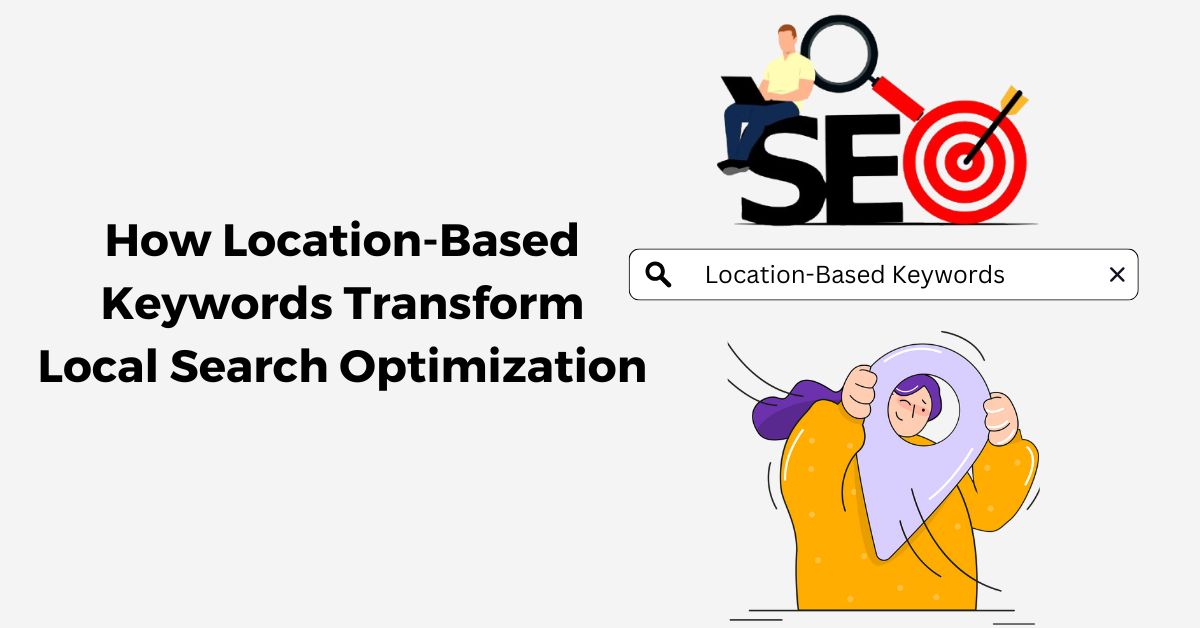How Do Location-Based Keywords Impact Local Search?
In today’s digital age, businesses are constantly seeking new ways to improve their visibility in local searches. Understanding how location-based keywords impact local search can be crucial for achieving this goal. In this guide, we explore the significance of these keywords and how they can benefit your local SEO strategy.
What is Local SEO?
Local SEO is the practice of optimizing a business’s online presence to attract more business from relevant local searches. These searches take place on search engines like Google, Yahoo, Bing, or even on social platforms like Facebook, Instagram, etc. The primary goal of local SEO is to ensure that a business appears in local search results when potential customers search for products or services related to their business in their geographical area. Successfully implementing local SEO strategies means that your business can appear prominently in Google Maps, the Local Pack, and in localized organic search results.
The importance of local SEO is undeniable for businesses with a local customer base. Whether you’re operating a brick-and-mortar store, providing local services, or running a restaurant, the ability to reach nearby potential customers who are ready to purchase is invaluable. Local SEO essentially bridges the gap between online searches and offline sales, making it a vital tool for local businesses.
The Role of Location-Based Keywords in Local SEO
Location-based keywords are search terms that include specific geographic locations. These keywords can help search engines understand that your business is relevant to users in a particular area. As a result, location-based keywords are instrumental in aligning the search intent with specific geographical relevance.
- City-specific keywords: These include the name of a city as part of the search term, such as “plumber in Chicago” or “best coffee shop New York.”
- Neighborhood-specific keywords: These are more granular and precise, targeting specific neighborhoods, like “florist in Williamsburg” or “gym in Downtown LA.”
- Regional keywords: For businesses that serve a larger area, regional keywords like “IT services in the Bay Area” can be the most effective.
Using these keywords strategically can enhance your local presence by ensuring your business appears in the correct searches, transforming searches into conversions and sales.
How Location-Based Keywords Impact Local Search
Location-based keywords improve local search results by making your business more visible to nearby consumers. These keywords work as signals to search engines, indicating that a certain company or service has geographical importance. Let’s delve deeper into how they impact local search:
By incorporating location-based keywords, your business’s likelihood of appearing in the unique “Local Pack” or “3-Pack” is significantly increased. This Google SERP feature showcases a map and highlights three local businesses that best match the local search query. Appearing in this pack provides prime real estate that captures both desktop and mobile users’ attention.
Moreover, businesses using these keywords effectively often report achieving higher click-through rates. For example, a local bakery in San Francisco that integrates “San Francisco bakery” into its online content and social media platforms may find itself drawing more clicks than a competitor failing to utilize location specifics.
The reach of location-based keywords also transcends metropolitan areas, bringing substantial benefits to rural businesses trying to stand out in more extensive regions. By targeting specific towns and municipalities, these businesses can cater to niche markets, ensuring they serve optimal and responsive demographics.
Best Practices for Using Location-Based Keywords
Leveraging location-based keywords effectively requires strategy and precision. The following are best practices to ensure these keywords yield tangible benefits for your business:
1. **Research and Identify Effective Keywords:** Start with reliable tools such as Google’s Keyword Planner, SEMrush, or Moz to identify keywords with optimal search volumes and low competition.
2. **Incorporate Keywords Naturally:** Seamlessly integrate these keywords into title tags, meta descriptions, headers, and throughout the copy. Overuse or awkward insertion detracts from the user experience and can result in penalties from search engines.
3. **Utilize Google My Business:** Ensure your Google My Business (GMB) listing is up-to-date and consistent. Include your location-based keywords in the business description and posts.
4. **Optimize for Mobile Users:** As local searches are increasingly conducted on mobile devices, having a mobile-friendly website is crucial. Ensure that your site loads quickly and is easy to navigate.
5. **Create Localized Content:** Regularly publish content that is meaningful to your local audience. Hosting local events or sponsoring community activities can serve as great material for blog posts, providing opportunities to incorporate local keywords.
Common Mistakes to Avoid with Location-Based Keywords
Avoid overstuffing keywords, ignoring on-page SEO, and failing to keep business listings up to date. These mistakes can negatively impact your local search rankings and should be avoided at all costs:
1. **Keyword Stuffing:** Excessively repeating your location-based keywords can lead to penalties from search engines. It’s crucial to maintain a natural flow in your content.
2. **Inconsistent Online Information:** Ensure that your NAP (Name, Address, Phone Number) information is consistent across all online platforms, including your website, GMB, and social media profiles.
3. **Neglecting Reviews:** Encourage and respond to customer reviews on platforms like Google and Yelp. Positive reviews can bolster your local SEO efforts.
4. **Ignoring Local Backlinks:** Cultivate backlinks from local businesses and directories. These links validate your geographical relevance to search engines.
Conclusion
Successfully leveraging location-based keywords is fundamental for businesses looking to enhance their local SEO. By understanding and implementing the best practices discussed, businesses can significantly improve their visibility and local search rankings. Avoiding common pitfalls will ensure that your strategies remain effective and align with search engine guidelines.
Want to learn more about optimizing local search for your business? Contact us today for tailored SEO strategies!







